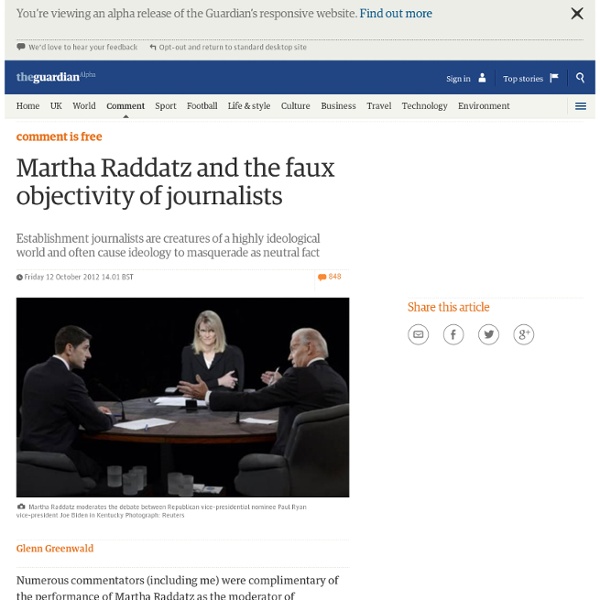Objectivity in Journalism
DAVID BROOKS There is some dispute about whether objectivity can really exist. How do we know the truth? Well, I’m not a relativist on the subject.
Principles of Journalism
The first three years of the Project’s work involved listening and talking with journalists and others around the country about what defines the work. What emerged out of those conversations are the following nine core principles of journalism: 1. Journalism’s first obligation is to the truth Democracy depends on citizens having reliable, accurate facts put in a meaningful context.
An Argument Why Journalists Should Not Abandon Objectivity
In “Losing the News: The Future of the News that Feeds Democracy,” published by Oxford University Press, Alex S. Jones, a 1982 Nieman Fellow and director of the Joan Shorenstein Center on the Press, Politics and Public Policy at Harvard University, describes in its prologue his purpose and intent in writing about the “genuine crisis” in news. “It is not one of press bias, though that is how most people seem to view it,” he contends. “Rather, it is a crisis of diminishing quantity and quality, of morale and sense of mission, of values and leadership.” In this excerpt from the chapter “Objectivity’s Last Stand,” Jones reminds readers how objectivity assumed its role in the tradition of American journalism, what “authentic journalistic objectivity” looks like when practiced well, and why it matters so much to the future of news reporting. I define journalistic objectivity as a genuine effort to be an honest broker when it comes to news.
Questioning Journalistic Objectivity
Journalism, as we've known it, has been mourned deeply over the last few years. The Internet has changed everything. "Citizen journalism," a phrase that still inspires dirty looks at most journalism conferences, has blurred the lines between objectivity and subjectivity, paid and unpaid labor, news and opinion. It gives veteran journalists agita to imagine totally untrained people messing around in their exclusive, albeit hardscrabble, club. With all this reshaping and shifting of our industry, all this talk about changing financial models and publishing structures, now is an opportune time to question one of the field's most defended values: objectivity.
Objectivity vs. Obligation
Photo by Chris Johnson.©
What is objectivity in journalism?
Objectivity is expressing or dealing with facts or conditions as perceived without distortion by personal feelings, prejudices or interpretations. Objectivity, as defined by the school of media ethics, means standing so far from the community that you see all events and all viewpoints as equally distant and important or unimportant for that matter. It is employed by giving equal weight to all viewpoints—or if not, giving all an interesting twists, within taste. The result is a presentation of facts in a true non-partisan manner, and then standing back to let the reader decide which view is true.
Objectivity in Journalism
Lack of objectivity in journalism threatens the very worthiness of the profession. Objectivity on the part of reporters, editors, publishers, and news directors go a long way to restore public trust and confidence in the profession. H. A. Myrick defined objectivity "As the expressing, or dealing with facts or conditions as perceived without distortion by personal feelings, prejudices, or interpretations". Objectivity in journalism ensures that personal feelings and opinions are put aside in order to avoid distorting the facts.
The Myth of Objectivity in Journalism
by This page has been accessed since 29 May 1996. The oft-stated and highly desired goal of modern journalism is objectivity, the detached and unprejudiced gathering and dissemination of news and information. Such objectivity can allow people to arrive at decisions about the world and events occurring in it without the journalist's subjective views influencing the acceptance or rejection of information.
Rethinking Journalism Ethics, Objectivity in the Age of Social Media
In response to the rapidly changing media environment, many schools and academic programs are offering novel approaches to journalism education. This seismic change creates tensions within programs, especially when it comes to how to teach ethics for this increasingly mixed media. In an earlier column, I put forward some principles for teaching ethics amid this media revolution.
James Moore: WikiLeaks and the Myth of Journalistic Objectivity
"Journalism can never be silent: that is its greatest virtue and its greatest fault. It must speak, and speak immediately, while the echoes of wonder, the claims of triumph and the signs of horror are still in the air." ~ Henry Anatole Grunwald There is a very simple reason WikiLeaks has sent a furious storm of outrage across the globe and it has very little to do with diplomatic impropriety.
Objectivity (journalism)
Journalistic objectivity is a significant principle of journalistic professionalism. Journalistic objectivity can refer to fairness, disinterestedness, factuality, and nonpartisanship, but most often encompasses all of these qualities. Definitions[edit] Sociologist Michael Schudson argues that "the belief in objectivity is a faith in 'facts,' a distrust in 'values,' and a commitment to their segregation



